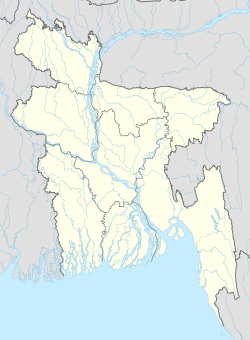Agailjhara Upazila
Agailjhara
আগৈলঝাড়া | |
|---|---|
| Coordinates: 22°58′N 90°9′E / 22.967°N 90.150°E | |
| Country | |
| Division | Barisal Division |
| District | Barisal District |
| Area | |
• Total | 161.82 km2 (62.48 sq mi) |
| Population (2001) | |
• Total | 155,661 |
| • Density | 960/km2 (2,500/sq mi) |
| Time zone | UTC+6 (BST) |
| Website | Official Map of the Agailjhara Upazila |
Agailjhara (Template:Lang-bn) is an upazila of the Barisal District in the Division of Barisal, Bangladesh, covering 155.47 km2.[1] It is located between 22°54' and 23°03' north and between 90°03' and 90°13' east. It is bordered by Gaurnadi Upazila to the northeast, Wazirpur Upazila to the south, and Kotalipara Upazila to the west.
Demographics
According to the 1991 Bangladesh census, Agailjhara had a population of 147,343 distributed among 30,560 households. 50.93% of the population was male, and 49.07% was female. There were 76,524 people aged 18 or over. Agailjhara had an average literacy rate of 42.4% (7+ years schooling), compared to the national average of 32.4%.
In the 2001 Bangladesh census, Agailjhara had a total population of 155,661 whereby males accounted for 50.23% (78,193) of the community, while 49.76% (77,468) were women. The population reduced in the 2011 Bangladesh census registering 149,456 total residents.
Religion
Islam is considered the predominant religion with 82,720 people identifying as Muslims, 63175 as Hindus, 3553 as Christians and 8 people worshipping other faiths. Agailjhara Upazila has the highest percentage share of Hindus among the 10 Upazilas of Barisal district but both the absolute numbers and the share of population has decreased since 1981.[2]
Administration
Agailjhara formed as a thana on 16 June 1981 and became an Upazila on 7 November 1983.
Agailjhara Upazila is divided into five union parishads: Bagdha, Bakal, Gaila, Rajiher, and Ratanpur. The union parishads are subdivided into 78 mauzas and 96 villages.[3]
Education
Agailjhara is home to many notable schools, including Shaheed Abdur Rob Serniabat Degree College, Askar Kalibari Secondary School and College (established in 1943), Goila High School (1893), and B. H. P. Academy (1919).
Secondary schools
List of secondary schools in Agailjhara Upazila:
- Agailjhara Bhegai Halder Public Academy
- Agailjhara Sreemalati Matree Mangal Girls High School
- Askar Kalibari Secondary School & College
- Bagdha Secondary School and College
- Bahadurpur High School
- Bakal Niranjan Bairagi High School
- Barpaika Secondary School
- Basail Secondary School
- Batra Premchand Girls High School
- Chhoygram Secondary School
- Dumuria Secondary school
- Goila secondary School
- Jamina Mohammed Secondary School
- Jobarpar Secondary School
- Kagasura Secondary School
- Kathira Adarsha Biddya Niketon
- Kodaldhoa Secondary School
- Mollapara High School
- Naghirpar Secondary School
- Paisa High School
- Rajihar Secondary School
- Ramananderak High School
- Ratnopur Secondary School
- Sheral Ml. High School
- Temar Maleka Khatun Girls High School
- Ulania Coronation High School
- Adarsha High School & College
- Valukshi High School
Non-profit organizations
See also
References
- ^ "Agailjhara Upazila - Banglapedia". en.banglapedia.org. Retrieved 2019-08-06.
- ^ "Bangladesh Population & Housing Census 2011 for Barisal District (Zila Series)" (PDF). Retrieved 22 September 2020.
- ^ "District Statistics 2011: Barisal" (PDF). Bangladesh Bureau of Statistics. Archived from the original (PDF) on 13 November 2014. Retrieved 14 July 2014.
- ^ "Payra Social Welfare || glory of sacrifice". www.payra.org. Retrieved 2017-04-14.


